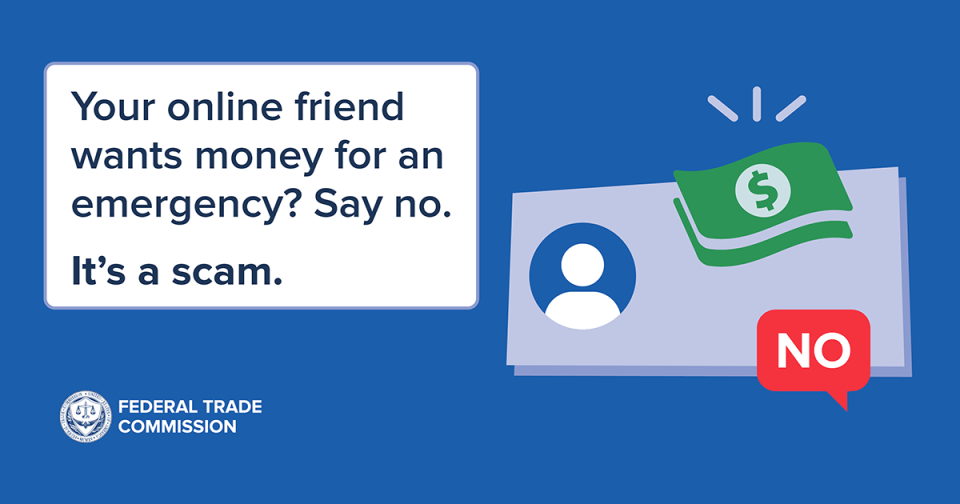If your new online friend or romantic interest says they have an emergency and need money, it might not mean they have bad luck. It’s more likely they’re a scammer trying to grab your money. So, how can you tell if an online “friend” is a fraud?
It’s hard to know who people really are when you meet them online. Scammers create fake profiles on social media, as well as game and dating sites. They might send you a friend request, start a conversation and friendship, chatting or texting daily. Surprisingly soon, they might say they’re in love with you. Then, suddenly, they’ll have an expensive emergency — a lost job, failed business, or sister who needs an operation — and appeal to you for gift cards, money transfers, even cryptocurrency.
Here are some sure signs you’re dealing with a romance scammer:
- They can’t meet you in person. It’s an early warning sign if they can’t meet because they’re outside the country on an oil rig, in the military, or with an international organization. Those are lies.
- They ask you for money. That’s always a scam. No matter the so-called emergency, they’re only trying to steal your money.
- They tell you how to send the money. Which is exactly what scammers do, focusing on ways to get your money quickly. Where it’s also hard for you to get it back. (Crypto, gift cards, wire transfer, payment apps…)
If you think someone is a scammer, cut off contact. Tell the social media platform, game site, and dating site, and then tell the FTC at ReportFraud.ftc.gov. Share this post in your socials to alert your followers of this scam.


I have occasionally seen such scams, and you are right to warn people. But for a mostly home-bound, mobility and vision impaired 70 year old woman without family, whose friends have mostly died or gone into nursing homes, Facebook is almost the only way to make friends - so who else would I tell when something goes wrong? Of course, I am not pretending to be romantically interested in anyone and I never actually ASK any individual for ANYTHING but prayers, but I HAVE posted my Amazon wish list and that sort of thing. It makes me sad that your article would lump me in with the same category of people you call scammers because according to you, it is always a scam, and you are wrong about that. There are a LOT of us "senior orphans" in the world these days who are lucky enough to live into their 70's and 80s and beyond, outliving all our friends and relatives, but it is sad that anyone would make our situation even MORE difficult by casting a suspicious light over us. I think your article is poorly researched and not well thought-out, otherwise you might have included people like us and methods to verify that people are who they say they are. For instance, the Facebook checkmark by someone's name indicates that their identity has been proven. (I have one of those.) Facebook friends CAN BE AND ARE OFTEN REAL FRIENDS.
In reply to I have occasionally seen… by SILVER S PARNELL
To Silver Parnell. Sorry for your circumstances but I have a friend right now who is getting scammed big time and it’s pathetic. What will be the worst is when it’s over and she sees how much money and effort she has put into this crook. You don’t need to research, in reference to your comment about this article not being researched…this is happening all over. This scam of my friend is so sophisticated using AI to appear like a famous Asian actor for FaceTime calls…unbelievable! She just got asked for $24K! Watch your senior acquaintances, friends and family members! So many fall prey and are too embarrassed to admit it was a horrible mistake even after they see their bank statements. It is NEVER easy to admit you’ve been scammed. That’s what keeps this underground scam business going.
In reply to To Silver Parnell. Sorry for… by Margoski
Scammers have become so sophisticated in their endeavors to get hard earned money from retirees, especially women, and if you’re single, the risk doubles! Everything researched and read about the dilemmas senior citizens face points to loneliness. Scammers have been taught well. They know exactly who to look for and they have some of the most incredible stories to tell you to lock you into their drama. Bottom line: never give money to someone you don’t know who has contacted you on social media. NEVER